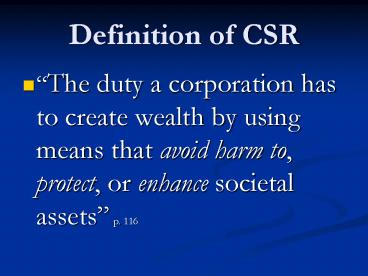Definition of CSR - PowerPoint PPT Presentation
1 / 14
Title:
Definition of CSR
Description:
The Evolving Idea of Corporate Social Responsibility. The fundamental idea is that corporations have duties that go beyond carrying ... – PowerPoint PPT presentation
Number of Views:82
Avg rating:3.0/5.0
Title: Definition of CSR
1
Definition of CSR
- The duty a corporation has to create wealth by
using means that avoid harm to, protect, or
enhance societal assets p. 116
2
Three Basic Elements of CSR
- Market Forces
- Mandated Social Programs
- Voluntary Social Programs
- Exceed regulations (legal plus safety,
pollution, discrimination,) - Respond to national consensus (charities)
- Actions beyond public consensus (work to make
changes)
3
Basic Elements of Social Responsibility
5-11
4
The Evolving Idea of Corporate Social
Responsibility
- The fundamental idea is that corporations have
duties that go beyond carrying out their basic
economic function in a lawful manner. - Over time the doctrine has evolved to require
more expansive action by companies largely
because - Stakeholder groups have gained more power to
impose their agendas - The ethical and legal philosophies underlying it
have matured
5-4
5
Arguments Against CSR
- Classical Economic Argument
Managements only responsibility is to maximize
the profits of its owners. - a. Role of business in our system
- b. Duty to shareholders - private property rights
- Cost of social action is passed on to consumers
- CSR decreases competitiveness (esp.
international) - Business already has enough power
6
Arguments For CSR
- CSR is in businesss long-term self-interest
- Must use power or lose legitimacy (social
contract) - Ward off government intervention regulation
- Public relations
- Ethical Imperative
- Other
- Businesses are reservoirs of skill
7
General Principles of CSR
- Corporations are Primarily Economic Institutions.
- Must follow the law.
- Managers must act ethically.
- Duty to correct the adverse social impacts they
cause.
8
General Principles of CSR cont.
- Social responsibility varies with company
characteristics (e.g., size, industry, location). - Managers should try to meet the legitimate needs
of stakeholders. - Comply with the norms of the social contract.
- Publicly report on market, mandated, and
voluntary actions.
9
Are Social and Financial Performance Related?
- A recent review of 95 studies over 30 years found
that a majority (53 percent) of businesses showed
a positive relationship between profits and
responsibility, while only 5 percent showed a
negative one. - Results inconsistent and ultimately inconclusive
due to methodological questions. - Safe to say corporations rated high in social
responsibility are no less profitable than lower
rated firms.
5-13
10
Concluding Observations
- Historically, corporations have been motivated
primarily by the central focus on profits. - Corporations are now being pressured to alter
this focus. - The idea of corporate social responsibility has
continuously expanded in meaning. - The power of stakeholders to define corporate
duty has increased. - The explosive growth of global trade and global
corporations has created new standards and
practices of social responsibility tied to global
norms.
5-24
11
Definitions
- Stakeholders
- Those who are affected by and affect the actions
of a firm. - Primary Stakeholders
- Those who have a formal, official or contractual
relationship with a firm. - E.g., stockholders, customers, employees,
communities, governmental agencies, - Secondary Stakeholders
- All other stakeholders
- E.g., environmentalists, media, trade
associations,
12
Stakeholder Management
- Strategic Approach
- Views stakeholders as factors to be taken into
consideration and managed while the firm is
pursuing profits for the shareholders - Multifiduciary Approach
- Management has a fiduciary responsibility to
stakeholders just as it does to shareholders.
Places stakeholders and shareholders on roughly
equal footing. - Stakeholder Synthesis
- The firm has a moral but not a fiduciary
responsibility to stakeholders
13
Criticisms
- Not a realistic assessment of power
relationships. - seeks to replace force with moral duty.
- Sets up too vague a guideline.
- Who is a stakeholder? What do we owe them? How do
we balance competing demands? - No single, clear, objective measure of
ethical/economic performance.
14
5 Major Questions
- Who are our stakeholders?
- What are their stakes?
- What opportunities and challenges do our
stakeholders present? - What responsibilities does our firm have to all
its stakeholders? - What strategies or actions should our firm take
to deal with stakeholder challenges and
opportunities?































